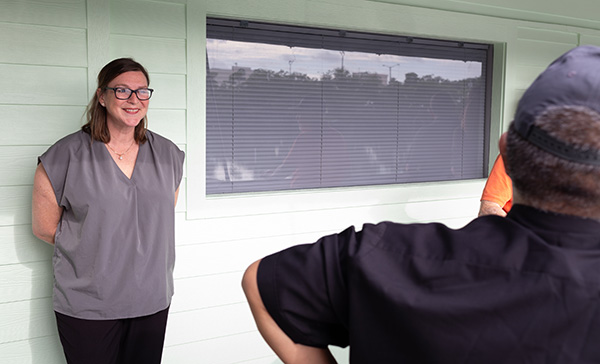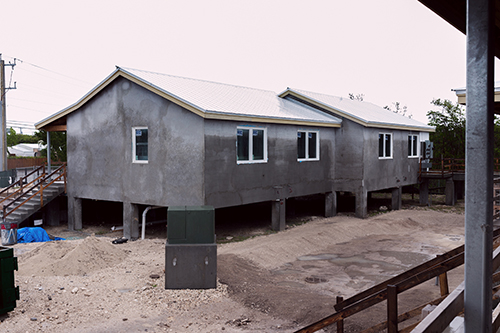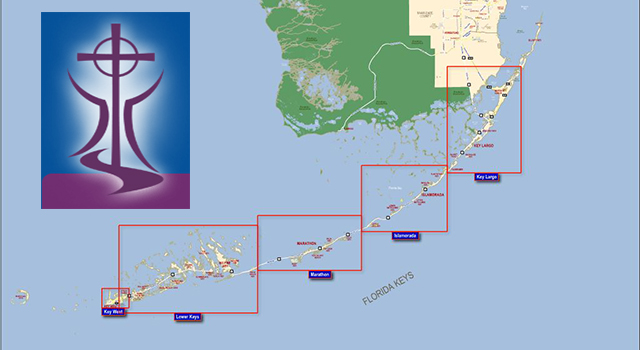By Tom Tracy - Florida Catholic
KEY WEST | The Florida Keys have emerged from the coronavirus lockdown with a low infection rate but exceptionally high unemployment.
Underscoring just how hard the mandated lockdown hit the Florida Keys region and its food service, hotel and tourism sectors, unemployment went from one of the state’s lowest to one of its highest — 18 percent in April compared to 1.9 percent in April 2019.
“I have heard from one landlord who owns three units, and she is letting her tenants pay what they can — typically $500 of $1,500 rent,” Patrice Schwermer, Catholic Charities outreach coordinator in Monroe County, told the Florida Catholic. "She is trying to wait, because people are doing the best they can."
Up until May 2, Catholic Charities had received some 500 phone calls from Keys residents seeking assistance. The office responded with rental and housing financial assistance that was left over from Hurricane Irma-related grants, until the funding was exhausted.

Photographer: TOM TRACY | FC
St. Theresa Apartments, on properties leased through the city of Key West for a dollar a year, is another aspect of Catholic Charities' efforts to provide affordable housing to the workers in Key West's many service industries. In this file photo, Meagan Hull, program director for Catholic Charities in Key West, speaks to members of the agency's board of directors who toured the region at the end of last year.
Well over $1 million had been poured into "rapid rehousing" programs for those impacted by Hurricane Irma, with Catholic Charities taking a leading role locally in terms of hurricane response grants and emergency response efforts.
“The requests were really high,” said Schwermer, who nevertheless continues to advise callers and offer community resources and guidance. “We have depleted the (Hurricane Irma) funding, and we were able to help as many as we could, but we had to stop.”
Schwermer said Catholic Charities has asked clients to apply for state unemployment and SNAP (Supplemental Nutrition Assistance Program). Some pockets of financial assistance are also available through community agencies, she said.
As the pandemic crisis moves into summer, Catholic Charities is looking at ways to replenish its housing financial aid. The goal will be to help people move into new rental units through the same program that Catholic Charities employs in Broward and Miami-Dade Counties, the New Life Rapid Rehousing Program.
That concept entails helping families or individuals with first and last month’s rent for new move-in arrangements, as well as rendering case management and support. The Catholic Charities office in Monroe County also hopes to hire a family enrichment specialist to augment the outreach.
Schwermer said Catholic Charities is also examining the availability of Emergency Solutions Grant funds from the U.S. Department of Housing and Urban Development, funds to be used for rental assistance.
“The whole goal is to prevent homelessness and to stabilize families — a huge need during this time of unprecedented unemployment,” Schwermer said.
Florida Gov. Ron DeSantis recently announced an extended freeze on residential evictions and foreclosures, offering continued respite for homeowners and renters struggling to make mortgage or rent payments due to the pandemic.

Photographer: TOM TRACY | FC
Affordable housing was a problem in the Florida Keys long before the coronavirus pandemic. This file photo shows the construction underway at Catholic Charities' St. Bede's Village in Key West, which is expected to be completed as early as this summer. The St. Bede's facility currently has 10 units of affordable housing with an additional 37 new units in the works.
The five Catholic parishes in the Keys — St. Justin Martyr on Key Largo; San Pedro in Tavernier; San Pablo in Marathon; St. Peter on Big Pine Key; and the Basilica of St. Mary Star of the Sea, Key West — were permitted to resume daily Masses in Monroe County in late May, but the entire area remained shut down to nonresidents until June 1.
Father Stephen Hilley, pastor of St. Justin Martyr, said the church’s weekly drive-up food distribution program and a St. Vincent de Paul ministry are operating at an accelerated pace given the current demand. The parish food bank is being fortified with both local donations and food from the SOS Foundation near Key West.
“The Keys industry is tourism, so as people are put out of work, their lifeline is cut off almost immediately,” Father Hilley said. “Sometimes you have a wife and husband both working in tourism, and the income stops.”
Apart from Catholic Charities, St. Justin Martyr was able to help one family with housing assistance made possible through a special Miami archdiocesan fund. But the needs currently outweigh the solutions.
“People are a little frightened that some of the jobs they had might not return — some of that concern might be correct. It’s not only a local fear but a state and national fear as well,” the priest said. “In moments like this just neighbor [helping] neighbor.”
Back in Key West, Schwermer said Catholic Charities continues to coordinate with community agencies through weekly conference calls that include public health reports on the coronavirus situation in Monroe County.
The area is bracing for a possible uptick in cases as tourism and business slowly reawaken. As of June 4, Monroe County reported 110 COVID-19 cases and only 4 deaths, according to the state Department of Health.
“People are very anxious about their financial situations, and so we have the health issue and the economics," Schwermer said. "Trying to find that balance is difficult.”

